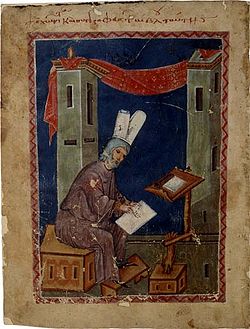- Niketas Choniates
-
Nicetas or Niketas Choniates (Νικήτας Χωνιάτης, ca. 1155 to 1215 or 1216), sometimes called Acominatos, was a Greek historian – like his brother Michael Acominatus, whom he accompanied from their birthplace Chonae to Constantinople. Nicetas wrote a history of the Eastern Roman Empire from 1118 to 1207.
Contents
Life
Nicetas Acominatos was born to wealthy parents around or after 1150 in Phrygia in the city of Chonae (near the modern Honaz in Turkey). Bishop Nicetas of Chonae baptized and named the infant; later he was called "Choniates" after his birthplace. When he was nine, his father dispatched him with his brother Michael to Constantinople to receive an education. Niketas' older brother greatly influenced him during the early stages of his life. He initially took up politics as a career, and held important appointments under the Angelus emperors (amongst them that of Grand Logothete or Chancellor) and was governor of the theme of Philippopolis at a critical period. After the capture of Constantinople during the Fourth Crusade in 1204, he fled to Nicaea, where he settled at the court of the Nicaean emperor Theodore I Lascaris, and devoted himself to literature. He died c. 1215–16.
His chief work is his History, in twenty-one books, of the period from 1118 to 1207. In spite of its florid style, it is of value as a record (on the whole impartial) of events of which he was either an eyewitness or which he had heard of first hand (though he should be balanced with the other Greek historian for this time, John Kinnamos). Its most interesting portion is the description of the occupation of Constantinople in 1204, which should be read with Geoffroi de Villehardouin's and Paolo Rannusio's works on the same subject.
His little treatise On the Statues destroyed by the Latins (perhaps altered by a later writer) is of special interest to the archaeologist and art historian.
His theological work, (Thesaurus Orthodoxae Fidei), although extant in a complete form in manuscripts, has only been published in part. It is one of the chief authorities for the heresies and heretical writers of the 12th century.
Nicetas in fiction
Umberto Eco's novel Baudolino (Milan: Bompiani, 2000. English translation by William Weaver, New York: Harcourt 2002, ISBN 0-15-100690-3) is set partly at Constantinople during the Crusader conquest. The imaginary hero, Baudolino, saves Niketas during the sacking of Constantinople, and then proceeds to confide his life story to him.
Editions and translation
- Imperii Graeci Historia, ed. Hieronymus Wolf, 1557, in Greek with parallel Latin translation. (PDF of 1593 reprint)
- Nicetæ Choniatæ Historia, ed. J.P. Migne (Patrologia Graeca vol. 140) reproduces Wolf's text (in more modern type) and translation (in standardized spelling). (PDF)
- Nicetae Choniatae Historia, ed. Immanuel Bekker, Bonn (CSHB), 1835, with Wolf's translation at the bottom of the page. (PDF)
- Nicetae Choniatae Historia, ed. Jan Louis van Dieten, Berlin (CFHB #11), 1975 (ISBN 3110045281).
- O City of Byzantium: Annals of Niketas Choniates, trans. Harry J. Magoulias, 1984 (ISBN 0814317642).
Studies
- Βασιλικοπούλου, Ἁγνή. «Ἀνδρόνικος ὁ Κομνηνὸς καὶ Ὀδυσσεύς», Ἐπετηρὶς Ἑταιρείας Βυζαντινῶν Σπουδῶν 37 (1969) 251–259. A seminal work on Choniates' use of Homer.
- Brand, Charles M. Byzantium Confronts the West, 1968 (ISBN 0751200530).
- Harris, Jonathan. 'Distortion, divine providence and genre in Nicetas Choniates' account of the collapse of Byzantium 1180–1204', Journal of Medieval History, vol. 26 (2000) 19–31.
- Simpson & Efthymiadis (edd.). Niketas Choniates: A Historian and a Writer, 2009 (ISBN 9548446057)
External links
- Excerpt in English on the Sack of Constantinople in 1204.
- A longer excerpt on the same.
 This article incorporates text from a publication now in the public domain: Chisholm, Hugh, ed (1911). Encyclopædia Britannica (11th ed.). Cambridge University Press.
This article incorporates text from a publication now in the public domain: Chisholm, Hugh, ed (1911). Encyclopædia Britannica (11th ed.). Cambridge University Press.
Categories:- Greek historians
- 1150s births
- 1210s deaths
- Byzantine historians
- Byzantine officials
- Anti-Gnosticism
- 12th-century Byzantine people
- 13th-century Byzantine people
- 13th-century writers
- 13th-century historians
Wikimedia Foundation. 2010.

